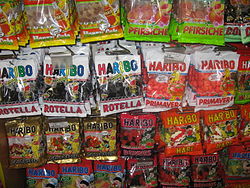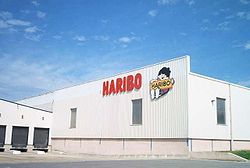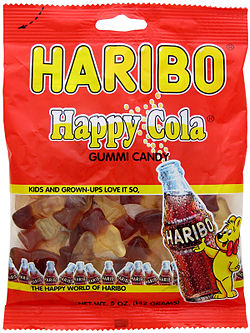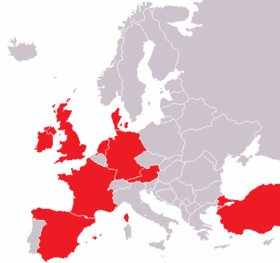- Haribo
-
Haribo 
Type GmbH & Co. KG Industry Confectionery Founded December 13, 1920 Founder(s) Hans Riegel Sr. Headquarters Bonn, Germany Key people Hans Riegel Revenue € 1.7–2.0 billion Employees about 6,000 Website haribo.com Haribo (
 /ˈhærɨboʊ/ harr-i-boh) is a German confectionery producer, founded in 1920 by Hans Riegel Sr. The company headquarters are in Bonn, and the name is an acronym for Hans Riegel, Bonn.
/ˈhærɨboʊ/ harr-i-boh) is a German confectionery producer, founded in 1920 by Hans Riegel Sr. The company headquarters are in Bonn, and the name is an acronym for Hans Riegel, Bonn.After Hans Riegel Sr. died during World War II, his son, also named Hans Riegel, took over the company. Haribo expanded its operations taking over many local sweet manufacturers in countries all over the world.
Today, Haribo is the biggest manufacturer of gummy and jelly sweets in the world, with its products mainly consisting of Gummi Bears, other jelly sweets and liquorice. There are five factories in Germany and 13 throughout the rest of Europe. There are sales offices in almost every country in Europe as well as in the United States and Australia.
Contents
Slogans
Haribo's German catch phrase is "Haribo macht Kinder froh – und Erwachsene ebenso", which is translated as "Haribo makes children happy – and adults too". The voice of Thomas Gottschalk has been connected with the Haribo advertisements since 1991. Slogans used in various languages around the world seem to be variations on the same theme, written to rhyme in most languages. Slogans around the world include:
Language Slogan English translation Bulgarian С Харибо сме радостни, Харибо обичаме
(S Haribo sme radostni, Haribo obichame)With Haribo we are happy, Haribo we love Croatian Haribo veseli sve, velike i malene Haribo makes everyone happy, grown-ups and little kids Czech Haribo chutná malým, stejně tak i dospělým Haribo tastes good to children, and also to adults Danish Haribo… den er go’
(old: Luk op for noget godt, luk op for Haribo – den er go')Haribo… it's good
(Open up for something good, open up for Haribo – it's good)Dutch The happy world of Haribo
(old: Haribo maakt kinderen blij - ouderen horen ook daarbij)
(Haribo makes children happy - and that includes grown-ups)English Kids and grown-ups love it so – the happy world of Haribo Same Thing Estonian Haribo teeb lapsed rõõmsaks, isad, emad lõbusaks Haribo makes children happy, fathers, mothers jolly Finnish Kids and grown-ups love it so – the happy world of Haribo French Haribo, c’est beau la vie – pour les grands et les petits Haribo, life’s beautiful – for grown-ups and little ones German Haribo macht Kinder froh – und Erwachsene ebenso Haribo makes children happy – and adults too Greek Haribo δίνει χαρά – σε μεγάλους και παιδιά Haribo gives happiness – to adults and children Hungarian Gyermek felnőtt kedve jó – édes élet Haribo Kids and grown-ups are in a good mood – sweet is life Haribo Italian Haribo è la bontà – che si gusta ad ogni età Haribo is the goodness – you can enjoy at any age Norwegian Haribo… den er go' Haribo… it's good Polish Haribo smak radości Haribo The taste of joy Portuguese Haribo doces sabores – para os pequenos e os maiores Haribo sweet flavours – for young and old Russian Детям, взрослым повезло – радость дарит Харибо
(Detyam, vzroslym povezlo – radost darit Haribo)Kids, adults are lucky – happiness is given by Haribo Slovak Haribo chutí malým, rovnako i dospelým Haribo tastes good to little ones, and to adults as well Slovene Haribo za otroke bo, in odrasle prav tako Haribo will be for children, and adults too Spanish Haribo, dulces sabores – para pequeños y mayores
or Vive un sabor mágico – ven al mundo HariboHaribo, sweet flavours – for young and old
Live a magical flavour – come to the Haribo worldSwedish Haribo det smakar bäst - Det gör livet till en fest Haribo it tastes best - it makes life a celebration Turkish Çocuk ya da büyük ol, Haribo’yla mutlu ol (Be) Young or old, be happy with Haribo Key brands
Haribo's key brands in the UK are Starmix, Tangfastics, Kiddies Supermix, Maoam and Strawbs. They were at one stage the distributor of Pez products in the United Kingdom but this is no longer the case. Haribo make Pontefract Cakes at their factory in Pontefract, West Yorkshire, and other locations. The Fraise Tagada is one of the best-selling varieties in France.
Products
US Products
- Hanging Bags
- Strawberry Wheels
- Brixx
- Fizzy Cola
- TropiFruitti
- Fruit Salad
- Fruity Pasta
- Gold-Bears
- Happy-Cola
- Peaches
- Fruity Frutti
- Raspberries
- Sour S'ghetti
- Strawberries&Cream
- Tangfastics
- Twin Cherries
- Wheels Licorice
- Rattle-Snakes
- Frogs
- Clown Fish
- Mini Rainbow Frogs
- Jelly Babies
US presence
Haribo had been imported into the United States for many years by German food importers, and sold at German and other gourmet stores at "gourmet prices", mostly in bulk. At home in Germany Haribo was not an exclusive gourmet product but a mass market candy like jujubes, Life Savers or Hershey's Kisses. When Haribo of America was incorporated in the 1980s in Baltimore, Maryland, Haribo's gummi candies were introduced to the U.S. mass market, through drugstores, grocery stores, discount stores, etc. The packaging was translated into English, and package weights were adjusted to match U.S. candy price points and package sizes. A laydown bag was developed for the U.S. supermarket trade, instead of the hanging bag commonly found in German supermarkets, and a boxed product was developed for theaters.
Once this was done and Haribo products in U.S. style packaging were introduced at confectionery and fancy food shows, Haribo became a popular item. Sales soared the first year and gummi-bears became so popular in the U.S. that Haribo in Germany could not supply enough product, so soon the U.S. market was flooded with German competitors like Trolli, Black Forest and others.
The Landesmuseum Koblenz (Germany) created a traveling exhibition about the history of Haribo in 2006.
Disputed use of forced labor
Haribo is accused of using Jewish forced labor in its factories during World War II but denies it.[1]
References
- ^ Wallace, Charles P. (2000-07-31). "The Final Reckoning". Time Europe (Berlin) 156 (5). http://www.time.com/time/europe/magazine/2000/0731/slave.html. Retrieved 2008-11-12.
External links
Categories:- Companies established in 1920
- Food companies of Germany
- Brand name confectionery
- German brands
- Companies based in Bonn
Wikimedia Foundation. 2010.




